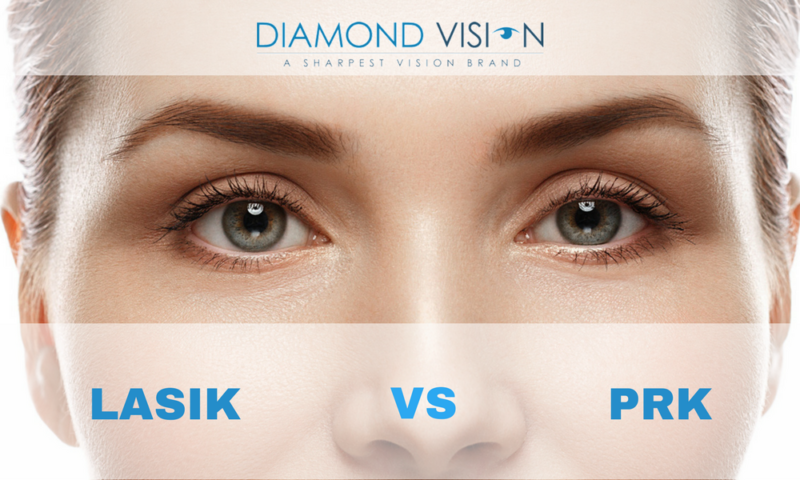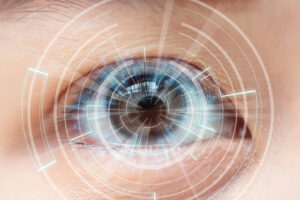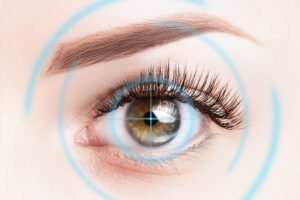
If you suffer from near-sightedness, far-sightedness, astigmatism or other refractive eye errors, you are not alone. These errors are caused by imperfections in the curvature of the cornea, which ultimately leads to distorted vision.
Luckily, they can be improved through LASIK or PRK surgeries, two of the most common procedures that correct many common refractive errors. When faced with a decision to choose LASIK vs. PRK, it is important to weigh out both options and determine which one is best for you.
What is LASIK?
LASIK is the most popular laser eye surgery. In fact, it is the preferred option for 96% of three million refractive surgery patients. In this procedure, an eye surgeon creates an incision in the cornea in order to create a flap of tissue. Under the flap, a laser carefully reshapes the inner layers of the cornea, which repairs the imperfections in the curvature.
This ultimately fixes the refractive errors. The flap is then put back into place, and the healing begins. LASIK surgery typically takes anywhere from ten to fifteen minutes per eye to complete, and recovery time is roughly one to three days. A majority of LASIK patients gain 20/20 vision after surgery is complete.
Best Candidates for LASIK:
LASIK might be a better option for those who:
- Are 18 years old+
- Have had a consistent vision for at least one year
- Have a thick-enough cornea for a tissue flap to created
- Do not participate in contact sports (i.e., boxing, martial arts, etc.)
- Have not had success with contact lenses
- Are not pregnant or breastfeeding at the time of surgery (hormones can affect prescriptions)
What is PRK?
PRK, or Photo Refractive Keratectomy, is another eye surgery used to correct common vision issues. In this refractive surgery, there is no creation of a corneal flap; instead, the procedure is performed on the surface of the cornea. Numbing drops are used to soften the cornea before a laser is used to reshape the cornea’s surface.
Similarly, to LASIK, PRK also takes ten to fifteen minutes per eye. The recovery time, however, is longer than that of LASIK; it typically takes four to seven days to heal, and a soft contact lens must be placed on the cornea to help protect the eye as it heals as well.
It is important to note that while both LASIK and PRK are strong options, only 5% of laser eye surgery patients opt for the PRK procedure. A small portion of patients also continues to wear glasses after this surgery, because it does not fully protect patients against the effects of aging and might not correct all refractive issues. Sometimes PRK patients will require touch-ups or follow-up enhancements after undergoing PRK surgery.
Best Candidates for PRK:
PRK might be a better option for those who:
- Are 18 years old+
- Have had a stable eyeglass prescription for at least one year
- Have previously had eye surgery, irregular astigmatism, or very thin corneas
- Do not have any abnormalities of the cornea or external eye
- Do not have any autoimmune diseases
- Are not pregnant or breastfeeding at the time of surgery
- Are not taking any medication which might interfere with the surgical and healing process
Though PRK and LASIK eye surgeries are both safe and effective, there are some differences and determinants that can help you decide whether PRK vs. LASIK might be better based on your eyes and vision. When it comes to providing exceptional results and top-notch customer satisfaction, no one does it better than us.
Our staff at Diamond Vision are some of the most experienced eye surgeons in the country and we believe in offering the very best options for treatment when it comes to your eyes and vision. One of our centres is the lasik eye surgery center in Atlanta, GA.
Contact Us
If you have more questions about LASIK procedures, get in touch with us.
Related Blogs

Timing is Everything: When to Consider LASIK After Nursing for Optimal Results
Timing is everything when considering LASIK eye surgery after nursing, and understanding the optimal period for this procedure is vital for both mother and baby.

Cataract Surgery: Restoring Clarity and Confidence
Cataract surgery is a transformative procedure that offers a new lease on clear vision and renewed confidence. As cataracts cloud the eye’s lens, causing blurred

Intralase LASIK Explained: What to Expect Before, During, and After the Procedure
Intralase LASIK is a cutting-edge procedure that offers a safe, effective, and precise way to enhance vision compared to traditional LASIK methods. Understanding what to
